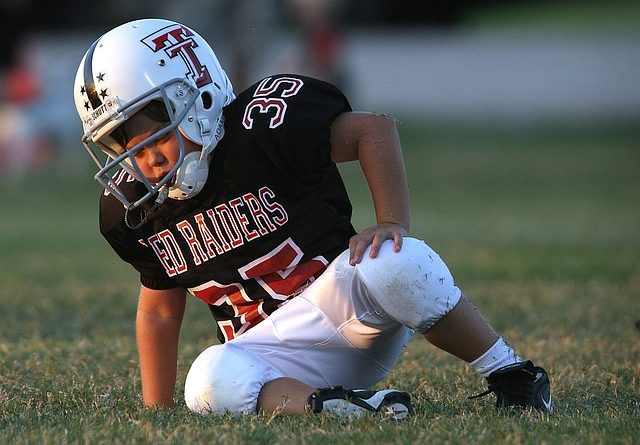Poll: Black, Hispanic parents nearly twice as likely as white parents to see youth football as a path to college scholarships, NFL
By TORRENCE BANKS
Capital News Service
Most parents understand the health risks of tackle football for children, but a new poll found significant differences in how Black, Hispanic and white parents of children under 18 view the benefits the game offers.
Black and Hispanic parents are nearly twice as likely as white parents to see youth football as a path to college scholarships and even to the NFL.
The poll, conducted by Ipsos, showed Black, white and Hispanic parents agree that youth tackle football helps children make friends, learn teamwork and become physically fit.
But then the results diverge by race.
The poll showed that 23% of white parents of children under 18 see the possibility of a scholarship as one of the game’s biggest benefits. That’s compared to 43% of Black parents and 42% of Hispanic parents who said the possibility of a college scholarship is one of youth football’s biggest advantages.
Thirteen percent of white parents of children under 18 said they see the possibility of playing professionally as one of the biggest benefits to kids’ playing tackle football. But that percentage is far higher among Black parents – 35% – and Hispanic parents – 37%.
Mallory Newall, vice president at Ipsos, said that while the poll shows Black and Hispanic parents are more likely to see the monetary benefits of the sport, the parents see learning teamwork, commitment and physical fitness as bigger benefits.
“We’re in a period where sports are being monetized like never before, both from the perspective of the NIL [allowing college and high school athletes to market their names, images and likenesses] and gambling,” Newall said. “And so I think, Black and Hispanic parents have shown that perhaps they’re a bit more attuned to that as a potential benefit.”
The poll found that most parents of children under 18 would let their children play tackle football even though the parents said they understand the health risks. Sixty-one percent of white parents said they would allow their child to play, as compared to 66% of Black parents.
The poll found a large majority of parents, Black and white, believe that children should not begin playing tackle football until they are 10 or older.
However, 12% of Black parents of children under 18 said that 5 to 7 years old was an appropriate age to begin playing tackle, as compared with 5% of white parents and 6% of Hispanic parents.
A significant percentage of parents in the poll would not let children play tackle at all. Twenty-four percent of Hispanic parents said that children under 18 should not be allowed to play tackle football, with 21% of white parents agreeing. Among Black parents, 13% said children under 18 should not be allowed to play.
Medical researchers who study brain disorders related to concussion, including chronic traumatic encephalopathy (CTE), said the number of years that children play tackle football is important. A recent study from the Boston University CTE Center found that playing for 11 years or more increases the chances of developing brain-related problems, including aggressive behaviors, depression and dementia.
As part of its “Don’t Hit Kids” initiative, the Concussion Legacy Foundation recommends that children wait to play tackle football until they turn 14.
The poll, conducted by Ipsos for The Shirley Povich Center for Sports Journalism and the Howard Center for Investigative Journalism at the University of Maryland, was conducted in November and included interviews with 1,655 Americans. Of those, 876 are parents of children under 18.
The margin of error for participants overall is plus or minus 2.9 percentage points. The margin of error is plus or minus 3.8 percentage points for all parents of children under 18.
The poll found that parents of children under 18 believe the medical findings about football-related brain injuries are conclusive. Seventy-nine percent of Black parents, 81% of white parents and 77% of Hispanic parents answered that they believe playing football is dangerous for young people.
But millions of parents allow their children to play tackle football.
Among parents of children who have played sports, 11% of Black parents said their child has had a concussion diagnosed by a medical professional, as compared to 5% of white parents and 6% of Hispanic parents.
For all parents, the poll suggests there is room for education on the dangers of head injuries that occur during games or in practice. Seventy percent of parents of children under 18 said they did not know that youth athletes experience an average of eight head impacts a season playing flag or tackle football.
Sixty-four percent of parents of children under 18 said they did not know that tackle football players ages 6 to 14 sustained significantly more head impacts during practices or games than flag players in the same age group.
Johnny Sawyer, research manager at Ipsos, said he was surprised by how little parents knew about the extent of the dangers football poses.
“There’s a lot of room for educating parents,” Sawyer said. “The poll shows that parents know that playing football can lead to head injuries. Once you sort of stray away from that basic fact, there’s not a lot of knowledge out there.”
Across the board, parents of children under 18 said they are worried about the risks tackle football presents. Ninety-two percent of all parents said they were concerned that “repeated head impacts can lead to traumatic brain injuries (TBI) and result in long-term problems, including ongoing problems with concentration, memory, and headaches.”
Ninety-one percent of parents of children under 18 are concerned that playing tackle football for more than 11 years can potentially cause “impulsive behavior and other thinking-related problems.”
And 91% of parents of children under 18 also said they are concerned that helmets do not provide excellent protection against concussions and other brain injuries.
Overall, people interviewed for the poll said football is less dangerous than living with a smoker, riding in a car without a seatbelt or riding in a car with a distracted driver.
They said football is more dangerous for children than baseball, gymnastics, soccer or jumping on a trampoline.
And a majority of respondents said though they know the risks associated with football, they still enjoy watching it.

Capital News Service is a student-powered news organization run by the University of Maryland Philip Merrill College of Journalism. With bureaus in Annapolis and Washington run by professional journalists with decades of experience, they deliver news in multiple formats via partner news organizations and a destination Website.

